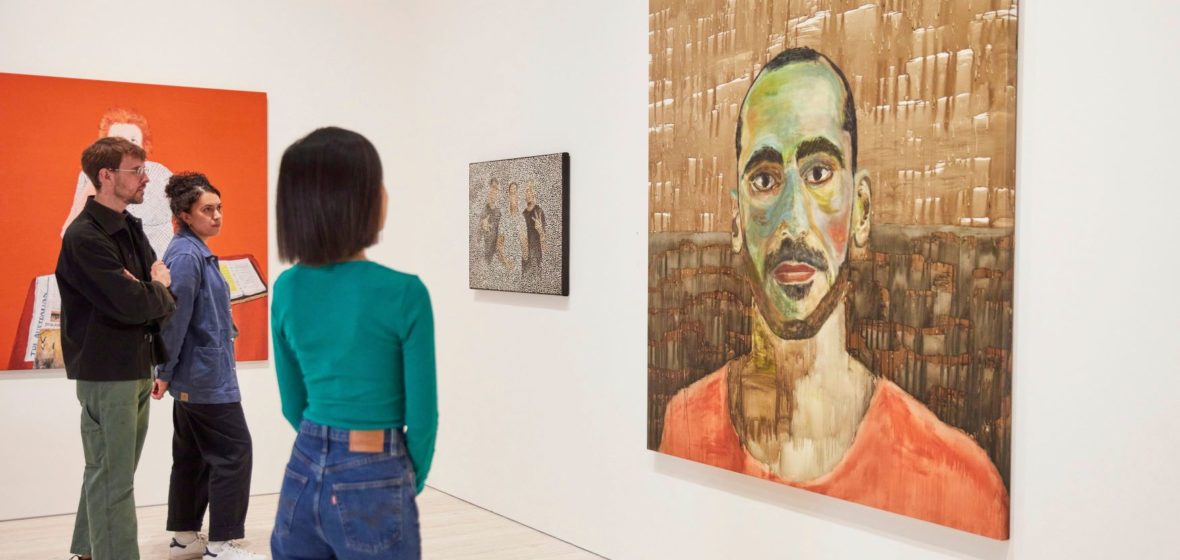After eight years in detention, Iranian-born Kurdish refugee Mostafa Azimitabar wants only to tell his story. Now a human rights activist, musician, and self-taught artist, he shares the journey behind his Archibald-finalist self-portrait KNS088, and what must change about Australia’s approach to asylum seekers.
What was going through your mind when you started working on this self-portrait?
I decided to paint my self-portrait to tell my story to people in Australia. I am a human rights activist and I have done a lot of interviews, but the world of art is very beautiful. Many people like art. People see the real story of the person who suffered in the painting and they connect to it easily.
Why was it so important that this work was a self-portrait, and not the portrait of another person you met in detention?
It’s important because the government kept me in detention for eight years, for no crime. They controlled the narrative and wanted to drive fear that these refugees are illegal. I wanted to show people the real story, that this person is not illegal. He’s a survivor.
The use of coffee in your work is very striking. It’s like you’re painting with something that someone else would consider a stain, but you saw an opportunity. Why coffee?
The coffee is a part of the story. When I was in detention, I didn’t have access to paints or brushes. I couldn’t have art supplies in my home. I asked the supervisor of security for some paint. He simply told me, “We cannot give you paint because you may eat the paint and it kills you.” I was very upset. Why did he think I was going to eat the paint? So, I was in my room – when I say room, it was a very unhygienic small place: the one I lived in for three years had 50 refugees in it. Officers coming in and out. There was a small table in the room with a cup of coffee with a toothbrush next to it. The words of the officer came to me. Suddenly, I grabbed the toothbrush, I put it in the coffee, and I dragged it on simple paper. It was like a moment of victory that they could not take from me. I was enjoying it; it was a fun activity that I didn’t take seriously. I was not a painter before, didn’t have any experience in art. It was just fun. I didn’t do it every day, just once in a while, and it brought me a smile they couldn’t take from me. Slowly I learned how to paint properly. I’m sure the first time I started, when I dragged on a paper, even a five year old could do it better. It was like a simple circle and two, three lines.
What was the process of working on this painting? Where were you? How long did it take?
I painted this self-portrait in my friend’s studio. His name is Angus MacDonald. He’s a six-time Archibald finalist. He always encouraged me to paint and said I had a place in his studio [in Lennox Head on the NSW North Coast]. He provided the canvas and the acrylic, and I brought the coffee and toothbrush. Angus asked if I was sure I wanted to use that, but I love it. He said, “go for it”. It took me eight days. I didn’t have a lot of time because we had to submit it to the Archibald Prize. Right before the floods were happening in Lismore, unfortunately. So they closed the local airport and grounded the planes. When they finally opened the border, I only had eight days left to paint and deliver it.
Was it a conscious decision to bring the story of the refugees to the country’s most famous art exhibition?
That’s true. I painted this self-portrait for the Archibald deliberately; because it’s a famous art event, it brings a lot attention to our story. The person I chose was myself, I am carrying the suffering with the stories I have. Stories of lacking things, like not even having art supplies. To show people I am one of the refugees locked up in Manus … That I don’t have hate in my heart and that love can kill the monster. We need to love each other, and the monsters will go away. I really believe people can connect with art. The toothbrush I use is like every refugee in the world – I am painting, so they torture me, but my weapon was a toothbrush. I challenged the whole system with the toothbrush and coffee. They reduced me to a number, KNS088. For eight years they called me that. All I had was this toothbrush, so I challenged the system that I am a human and a human can paint. They told me that refugees are illegal and dangerous. I had escaped from my homeland because I was in danger. I was a human rights activist, so I came to your land for safety and they kept me and took eight years of my life. But I don’t have hate. I forgive. I totally forgive, but I won’t forget.
LSJ Media has two tickets to give away for the Archibald Prize, at the Art Gallery of NSW until 28 August 2022. To enter, please send your postal address and LawID to journal@lawsociety.com.au by 5pm on Thursday 4 August.
This is an extract of an interview with Mostafa Azimitabar. Read the full interview in the print July 2022 Law Society Journal, available now.




